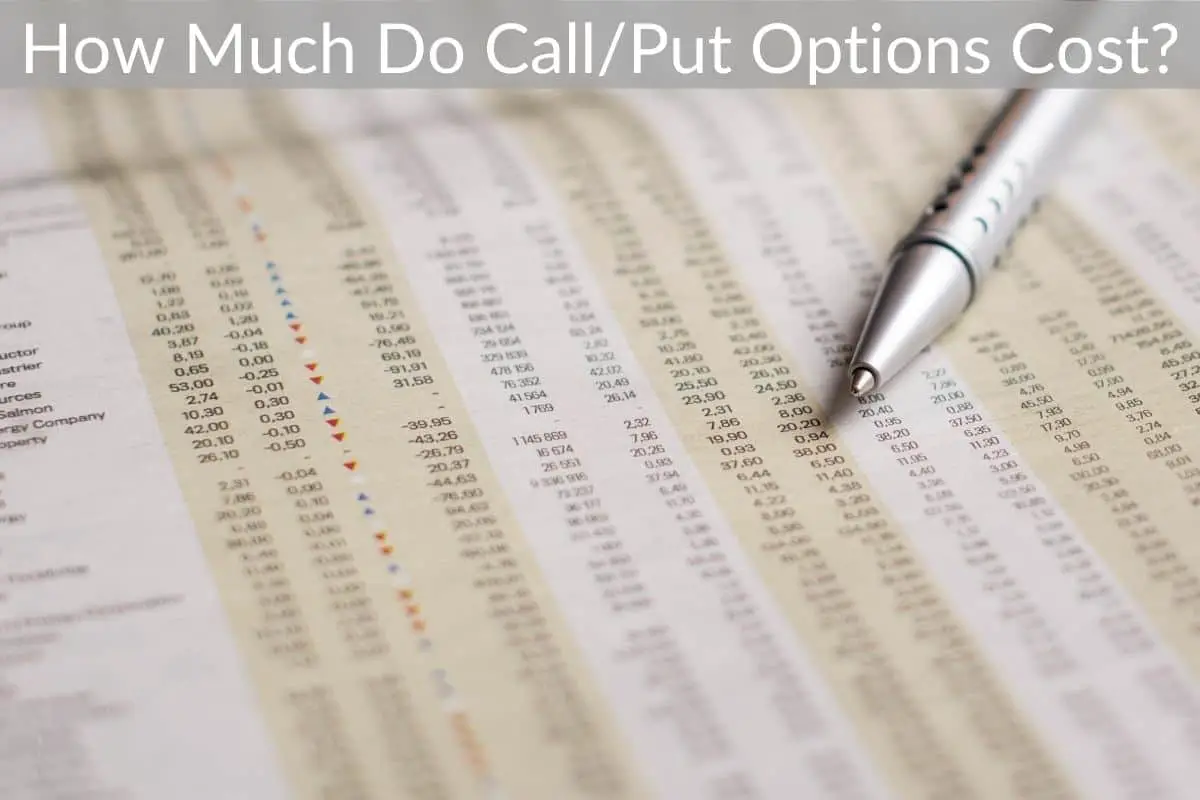Table of Contents
*This post may contain affiliate links. As an Amazon Associate we earn from qualifying purchases.
When trying out options trading for the first time, you’ll want to know how much the options cost. Having this information allows you to come up with a better strategy.
Luckily, it’s usually easy to determine the price of an options contract based on stocks.
Options contracts often represent 100 shares of an underlying stock. You’ll pay a premium for each contract as well. For example, if an option has a premium of 40 cents per contract. That means buying one option would cost $40. (40 cents times 100 is $40 total for the option.)
To see exactly how much a call or put option is currently trading for all you have to do is go to your brokerages website or app and look at the options chain. Then multiply the price listed there by 100 to get the total that an option is currently selling for.
If you want to learn more about the price of options, be sure to stick around! There’s a lot to know, and I made sure to cover the most important concepts in this article for you.
Are Options Cheaper Than Stocks?
Many people wonder if options are cheaper than buying stocks. Luckily, this is true! If you don’t have the funds to trade a more expensive stock, you can always learn to turn a profit with options and move onto stocks later if you’re interested.
Buying options is considerably cheaper than directly buying shares of stock. If you’re buying a stock at $100 a share, it would cost you $10,000 to buy 100 shares! However, if you purchased a call option for $10, it would only cost $1,000 to control the same 100 shares. That’s a difference of $9,000.
Going for the option costs a lot less. You can keep the remaining funds or invest them somewhere else. Either way, the lower price makes it easier for more people to participate in trading options.
However it is important to note that options are cheaper for a reason… they expire. If the stock price doesn’t move and you own the stock shares then it really doesn’t matter.
However if you own the options and the stock price doesn’t move eventually those options will expire and you could lose your entire investment (if the stock doesn’t move at all).
This quick YouTube video explains what calls and puts are, if you need to better understand before reading more:
How Much Do Call Options Cost?
If you’re looking into call options, you want to have an idea of their price beforehand. You must remember that options hold shares in bundles of 100- the prices come from that amount.
Your call options also should be cheaper than directly buying the stock.
Call options base their cost on the premium. You can take that number and multiply it by 100 shares to get the total price. For instance, the strike price of a call might be $20 with a $2 premium. That means you’ll spend $200 for the contract to control 100 shares.
As the underlying stock price rises, you earn a profit on the options. Since every options contract is actually 100 shares, going a dollar over the strike price means the option went up $100 more in value.
How Much Do Put Options Cost?
You can calculate put option costs in the same way as you would a call option. However, put options tend to be more expensive, as they can be more volatile.
You again need to consider the premium price and the 100 shares.
If a stock has a strike price of $50 and a premium of $5, the total put option would cost $500. However, you also need to pay fees to buy the put (unless you trade with one of the commission free brokerages). With puts, you profit when the stock declines in value, but as with calls, your loss can’t go above the premium you initially paid when buying the put.
In short, you can always determine the price of the contract as long as you know what the premium is on the option. Simply take that number and multiply it by 100. Additionally, puts tend to have a higher price than calls.
Why Put Options Are More Expensive
Put options can get quite expensive. The further out of the money they are, the cheaper they will be but also the less likely you are for them to reach that strike price.
Puts will often be more expensive because people often expect stocks or indexes to fall. Therefore there is more demand for puts and that drives up the prices.
When To Buy Options
Traders often buy options when they know the underlying assets will soon move in a set direction. For example, you buy a call when you think the value will go up, but you will buy a put when you expect it to drop.
Suppose you need to learn more about the basics of buying and selling options. In that case, I recommend that you read Options Trading for Beginners: The STEP by STEP Guide by Benjamin Ray Kratter.
The book clears up many of the unknowns that come with option trading, allowing you to make more innovative investments with confidence.
Overall, you can buy options as an alternative to stocks. These options are much cheaper and still offer you a way to earn an income through trading.
You can also learn more about calls and puts by reading other articles on this website. That way, you can feel even more prepared before buying or selling options.
The Advantages of Options
There are three main advantages to using options, according to the Balance. These mainly have to do with the premium selling the calls or puts and not buying them.
- Selling put options gets you the premiums right away.
- When prices drop to a put’s strike price, you can have control over what you pay.
- The premium you receive puts a buffer between you and financial loss.
In short, knowing how to buy and use options will help you take advantage of all the benefits that they have.
You’ll want to learn when it’s best to buy each type of option so that you can earn a higher profit from all of your trades. Always consider your budget, the price of the options, and what levels of risk you can take.
Final Thoughts
To summarize, you can quickly determine how much an option costs, whether it’s a call or a put. You just need to know the premium price you have to pay, then multiply that by 100 for the number of shares in an option.
These types of assets generally are more cost-efficient than buying the stocks outright. If you’re more comfortable with volatility on the market, then put options would be the better choice for you.
Call options gain value when their underlying stock goes up, which can net you a high profit when you strategize or are right on your guess.

